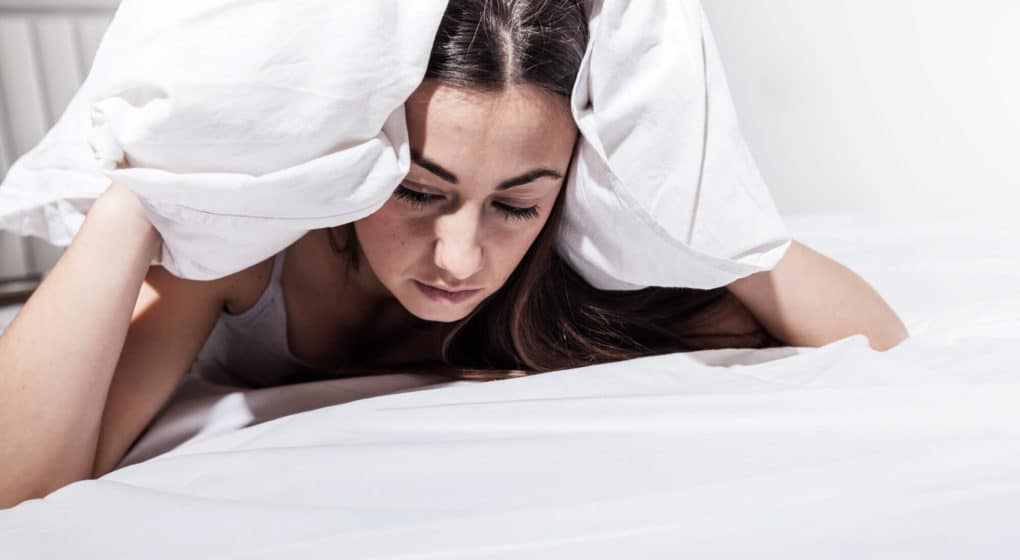Natural Remedies for REM Sleep Behavior Disorder (RBD)

March 24, 2020 | By Mark Hansen
Sleep is one of the body’s primary recovery mechanisms. It provides the means for the body to repair and replace bone and muscle tissue, while also allowing time for both mental and cognitive recovery.
With this in mind, if you don’t get adequate sleep, you see huge declines in health and function as a result.
It is for this reason that over the last decade we have seen an abundance of research looking into the many sleep disorders known to man, the impact that they can have on the body and on the mind, and their potential treatment modalities.
One such sleep disorder is REM Sleep Behavior Disorder (RBD).
What is REM Sleep Behavior Disorder (RBD)?
Rapid Eye Movement (REM) sleep is a stage of sleep characterized by higher frequency brain activity. This causes the muscles found within the eyes to contract often during sleep, which in turn stimulates the eyes to begin to move around rapidly – hence the name rapid eye movement sleep.
This stage of sleep is thought to account for approximately 20 percent of an adult’s sleep cycle, and has been shown to play an important role in the maintenance of cognitive function, while also enhancing learning, memory, and mood.
Interestingly, REM sleep is also where most dreams occur – although it is important to note that people with normal sleep patterns do not move during REM sleep.
However, this isn’t the case with people who suffer from RBD.
You see, RBD is a specific sleep disorder where you physically act out extremely vivid (and often unpleasant) dreams with loud vocal sounds, and sudden explosive arm and leg movements during stages of REM sleep.
As a result, RBD is sometimes also known as ‘dream enacting behavior’.
Depending on the individual, the onset of these movements can be either gradual or quite sudden, and they may also occur multiple times per night. Interestingly, the disorder typically becomes worse with time.
What are the Health Effects of RBD?
Now, RBD is slightly different to many other sleep disorders because it doesn’t necessarily impact the quality or duration of your sleep. As a result, it doesn’t appear to cause significant reductions in cardiovascular and metabolic health or increase the risk of developing inflammatory diseases.
However, it does pose its own unique set of issues.
Can RBD Cause Injury?
First and foremost, RBD causes rapid physical movement during sleep. This can mean anything from swinging the arms manically, kicking the legs wildly, and actually physically getting up and moving around the house.
As a result, those individuals suffering from RBD are at a rather high risk of inflicting physical injury upon both themselves and their partners. With this in mind, it is quite common for people suffering RBD to wake with bruises and other musculoskeletal issues such as sprains and bone breaks.
Additionally, it is quite common for their partners to also experience similar outcomes.
Does RBD Cause Parkinson’s Disease and Dementia?
There is some interesting research demonstrating that those individuals who suffer from RBD are also much more likely to develop certain neurodegenerative disorders such as Parkinson’s disease and multiple system atrophy (MSA) disease.
Building on this a little further, people diagnosed with RBD are also likely to experience age related declines in cognitive function sooner than those who do not have RBD, and are subsequently also at an increased risk of developing dementia.
Does RBD Cause Cognitive Dysfunction?
There is an increasing amount of evidence showing that RBD patients are much more likely to perform poorly on numerous tests of neural and cognitive capabilities. In general, they tend to exhibit worse short and long-term memory recall, attention capabilities, learning abilities, and general cognitive capacity, than their healthy counterparts.
While the exact mechanism behind this remains unclear, it does suggest that the factors underpinning both the cognitive dysfunction and early onset dementia in RBD patients may be closely linked.
Can RBD Cause Depression and Anxiety?
And finally, there is evidence to suggest that those individuals who suffer form RBD are much more likely to experience signs and symptoms of both depression and anxiety compared to those individuals who do not suffer from RBD.
Again, the exact mechanism behind this interesting relationship remains unclear.
How to Help Treat RBD Naturally
RBD is an interesting disease that can have some rather negative outcomes. Fortunately, there are some certain steps you can take to reduce the severity of RBD naturally, thus reducing the negative outcomes associated with its diagnosis.
Start Taking Melatonin
Melatonin is specific a type of hormone made within your body by your Pineal Gland (a hormonal gland found within the brain). Interestingly, both production and secretion of melatonin are stimulated by darkness and a reduced exposure to light.
With this in mind, melatonin is ultimately responsible for maintaining the Circadian Rhythm of the body. This rhythm describes your body’s internal clock, which dictates both when you fall asleep and when you wake up. It therefore holds extreme importance in regard to your body’s regular internal schedule.
You see, when it’s dark, your body will increase its secretion of melatonin tenfold. This causes sensations of tiredness and relaxation across your body’s systems, enhancing your ability to fall asleep, while also causing a deeper sleep of higher sleep quality.
Taking all of this into consideration, the supplementation of melatonin has been shown to enhance the sleep quality of those individuals suffering from RBD, while simultaneously reducing the severity of their symptoms.
One of our favourite melatonin supplements are Nature Made Melatonin Tablet. These are both extremely affordable and highly effective.
Maintain a Normal Sleep Routine
There is evidence demonstrating that sleep deprivation and overtiredness can exacerbate the symptoms of RBD.
As very simple way of avoiding this is to develop a consistent sleep routine that has you both falling asleep at the same time every night and ensuring that you get the same amount of sleep (somewhere between 7 and 9 hours is perfect) every single night.
This will cause a significant increase in sleep quality, reduce sensations of overtiredness, and help reduce any RBD symptoms.
Avoid Screens Before Bed
Almost all electronic devices (such as computers, tablets, phones, and TVs) exhibit what is known as blue light.
As its name so obviously suggests, blue light is a specific form of light that sits in the blue wavelength of the light spectrum. This type of light is quite interesting as it physically stimulates certain receptors within the eyes, which then send powerful signals to your brain – stimulating sensations of alertness and increased wakefulness.
As a result, it can seriously inhibit not only your ability to fall asleep, but also the depth of sleep that you experience throughout the night.
As a result, people suffering from RBD should try and avoid screens for at least an hour before bed. This should help promote a more relaxed and deeper sleeping environment, thus limiting the severity of their physical symptoms.
For those who don’t think that they can give up screens at night, you can also try blue light blocking glasses. Some of our favourites are the Gunnar Optiks PPK Unisex Glasses.
Avoid Alcohol Before Bed
The consumption of alcohol has been shown to reduce the amount of time you spend in a state of ‘deep’ sleep, while also increasing restlessness throughout the night. As you can imagine, this can make the symptoms of RBD significantly worse.
As a result, if you suffer from RBD, reducing your alcohol intake is a surefire way to help limit its impact throughout the night.
Safeguard Your Bedroom
Now, this isn’t necessarily going to help treat the your RBD, but it will go a very long way to helping limit the injury risk inherently associated with this unique disorder.
Safeguarding your bedroom by moving any objects away from your bedside, placing the bed away from any windows (and ideally placing something in front of those windows), and placing pillows next to the bed to create a soft surface, is a surefire way to reduce the likelihood of incurring physical harm to your body during sleep.
This is integral during the early stages of RBD treatment, where its symptoms are likely to be on the more severe end of the spectrum.
See a Medical Professional
And finally, in conjunction with all of the above, it is still within your best interest to seek the advice of a qualified medical professional. As RBD is a disorder that has specific physiological underpinnings, some of its most effective treatment modalities come in the form of pharmaceutical grade medications.
With this in mind, if you have tried all of the above options and find yourself seeing little (or no) improvement, then it might be time to seek other avenues of treatment.
While we firmly believe that taking the above tips on board will go a very long way to healing your RBD naturally, it won’t do it all for absolutely everyone – and as a result, sometimes further medical treatment will be required.
Conclusion
RBD is a unique disease that can cause a host of sleep related issues. With this can come an increased risk of physical injury, a heightened risk of developing neurodegenerative and dementia, declines in cognitive function, and associated emotional distress.
It’s really not good.
On a more positive note, there are certain steps you can take to start treating your RBD in a completely natural manner. As always, if you have had any experience with the methods outlined in this article then we would love to hear about it, so please drop us a comment and we will get back to you ASAP.

Article by
Mark HansenMark Hansen is a passionate sleep enthusiast and the founder of 40Winks.io, a popular blog dedicated to promoting healthy sleep habits and improving sleep quality. With years of experience in the healthcare industry, Mark has become an expert on the science behind sleep and its impact on overall health and wellness. He believes that everyone deserves a good night's sleep and works tirelessly to provide his readers with practical tips and advice for achieving optimal sleep. Mark's commitment to spreading awareness about the importance of sleep has earned him a loyal following and made 40Winks.io a go-to resource for anyone looking to improve their sleep quality.
